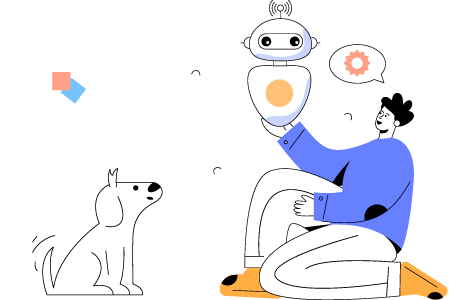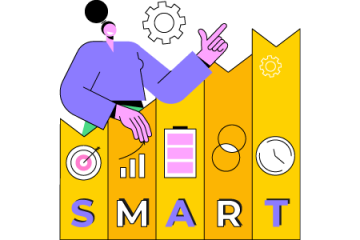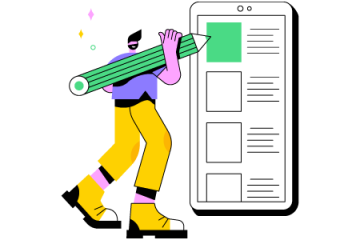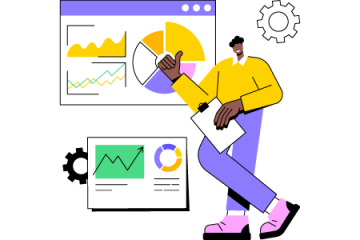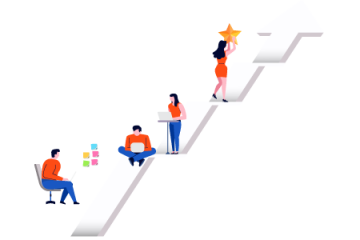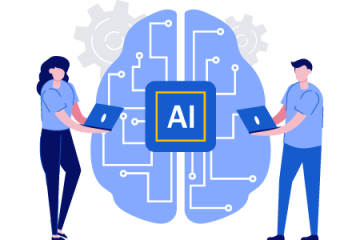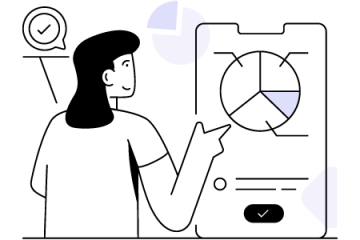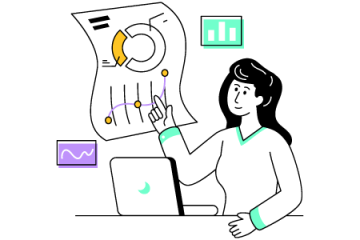As of now, it's the 21st century and technology has highly advanced to the point that most of the human work can be dealt with by advanced machines and technology where AI plays a great role. So what is AI and what benefits can you get from AI? In this blog, you will learn about the roles of AI in education that will be useful for you as a learner and help you answer your questions in a clear manner.
Artificial Intelligence (AI) is the intelligence of machines or software that are programmed by the programmer and make decisions like humans. AI enables various tasks such as problem-solving, and data analysis to perform easier and faster according to the given instructions. It can also be used as a learning material that assists educators as well as learners. In simple words, AI is a pre-programmed machine-usually software, that can do the task much faster and in a simpler way, as programmed.
How Education can benefit from AI?
Artificial Intelligence (AI) in education is a transforming force that enhances learning and teaching proficiency. AI can greatly impact the education sector in a positive manner. Using advanced patterns and algorithms, AI can analyze learners' pace and performance thus providing data that showcases the mistakes made and greatly improves their activities. Virtual tutors and Chatbots can be used to get feedback from recent education reports and guide you to the right path for learning effectively.
Furthermore, AI can also be used at school to make learning more interesting by providing much more data than usual. This helps students visualize the theory in a practical manner which creates a deeper understanding of the subject, enhancing their knowledge capability. Al used in online education can greatly shape the educational method breaking geographical boundaries. Educators and learners can both benefit from this as it assists educators with the necessary material for teaching. As for the learners, they can get various learning materials as per the analyzed data.
Personalized Learning
Personalized learning experiences provided by AI are transforming education drastically. AI systems evaluate specific learners' strengths, limitations, and learning preferences through data analysis and create plans according to the learner's needs. To accommodate each student's particular demands, they modify the material, pace, and resources in order to guarantee that students advance at their own rate. Due to this, students can improve themselves in an effective way with instructional information.
Learning Platforms
AI-based learning platforms have become more advanced in this modern era. These platforms provide an interactive and effective experience for learning. Incorporating multimedia, gamification, and real-time feedback, they captivate students' attention and encourage active participation, enhancing the overall learning experience. Integrating AI in the classroom helps to provide proper guidance to the students.
Adaptive Learning
AI uses advanced algorithms to inspect data that has been analyzed and give out the necessary set of materials making the learning process tailored and effective. As a result, students encounter content that aligns precisely with their existing understanding levels, facilitating a better learning experience that helps them understand and continuously advance to the next level.
Virtual Guidance
Virtual tutors and Chatbots provide services related to education. They provide instant support for students in need. In addition to that they provide proper explanations for complex topics as well as simplifying the content and aiding with any homework assignments. This greatly enhances the overall learning experience, guaranteeing that students receive continuous support exactly when they need it.
Assessment and Evaluation
AI simplifies assessment and evaluation processes. It automates tasks like grading and reducing administrative burdens on educators. It also provides explanatory notes with examples that can benefit students immensely. It also generates data-driven insights into student performance, helping educators make informed decisions to enhance their teaching methods.
Smart Content Creation
Educators get help from AI to prepare learning material such as course exercises, lesson plans, and quizzes for their representing class. It saves time allowing them to focus on facilitating engaging and interactive learning experiences for their students. The materials are well-organized so that students would not have any problem with the provided content.
Unlimited Boundaries
AI-powered online education breaks down geographical boundaries. It enables learners from around the world to access high-quality educational materials and instructors. This accessibility broadens educational horizons, making learning opportunities available to those who might have limited access to traditional classrooms.
AI Sites for Students
Certainly, various AI tools and technologies are being developed and used in education to enhance the learning experience. Here are some of the AI tools for education:
- Cognii : Their key product is a virtual learning assistant using conversational technology to help students improve open-format responses and critical thinking. The assistant also offers personalized tutoring and real-time feedback, enhancing individual learning needs and fostering interactive, adaptive learning experiences.
- Knowji : Knowji is a leading AI education tool, especially for language learners. It uses audio-visual techniques and educational research to enhance learning. It tracks word progress and predicts when users may forget, thanks to a spacing repetition algorithm. By combining AI and education principles, Knowji helps students build vocabulary efficiently and retain knowledge effectively.
- Querium : Querium is an AI focused platform that helps students master crucial STEM skills. Personalized lessons and AI-driven tutoring assistance enhance learning quality and speed, leading to improved student outcomes. Educators benefit from AI analysis of student responses and session durations, providing insights into learning habits and areas for improvement.
- Gradescope AI : Gradescope, powered by AI and machine learning, streamlines assessment tasks for students, making peer assessments and feedback less time-consuming. This technology allows teachers to allocate their time and energy more efficiently by automating grading for paper-based exams, online homework, and project preparation, all within a single platform.
- Century Tech : Based in London, Century Tech offers an AI-powered platform that creates personalized learning plans for students in online education, reducing teacher workloads. The platform tracks progress, identifies gaps and provides tailored study recommendations. It also aids teachers with AI-driven resources to streamline tasks like lesson planning and grading, allowing more focus on effective teaching.
- Plaito : Plaito operates as a virtual coach, offering valuable prompts and suggestions to assist students in enhancing their writing, debating, and collaborative skills in novel and engaging ways. Utilizing the capabilities of AI, this tool not only provides guidance but also extends the benefits typically associated with one-on-one tutoring. It cultivates deep comprehension, confidence, clarity, and empowerment among all students, promoting more effective and personalized learning experiences.
What is Conversational AI?
Conversational AI in the education sector is reshaping by introducing dynamic and personalized learning experiences. These AI systems interact with students through dialogues and provide instant support, clear explanations, and virtual guidance. Its working algorithm allows them to predict the user's pace and preferences and provide educational content accordingly. Thus student gets a deeper understanding of topics which allows them to learn at a faster speed. Additionally, conversational AI service is 24/7 which assists the learner in getting instant guidance and support anytime anywhere. It also assists educators or teachers with administrative tasks and provides student performance reports and teaching material for efficient teaching.
Virtual Collaboration Platform
Conversational AI enhances virtual collaboration platforms by facilitating seamless communication and workflow efficiency. It enables natural language interaction, making remote teamwork more intuitive and engaging. Additionally, AI-driven virtual assistants help manage tasks, prioritize messages, and provide real-time translations; fostering global collaboration. Overall, Conversational AI improves productivity, fosters inclusivity, and streamlines communication in virtual collaboration, making it an invaluable asset for modern remote teams.
Quiz Applications
The Conversational AI quiz application can be taken to a different level. Students can gain a broad or specialized understanding of a subject. Quiz applications have various modes such as multiplayer, challenges, etc. where they can compete with either bots or other humans. This accommodates their learning interest through competitiveness and takes on any challenges to reach the top. Conversational AI helps to provide a seamless quiz for the students with its natural language processing capabilities.
Chatbots
Chatbots uniquely help students by providing support like tutors who have a 24/7 presence. Students can ask for aid if he/she has a problem with any complex topic. It answers any question asked and immediately gives feedback. Chatbots can also provide educational tools that can help students get the upper hand in problem-solving skills. Chatbots can adapt to individual learning styles, act according to the problem students are facing, and give a faster response.
Interactive Learning Methods
Conversational AI enhances interactive learning by enabling personalized engagement between learners and visual tutors. With this; real-time effective interaction between learners and virtual tutors is possible. Learners can get feedback, and explanations and can discuss many complex topics. Additionally, Conversational AI is available 24/7 to educational resources with enabled self-paced and flexible learning. This AI technology helps learners to engage in more interactive learning sessions, ultimately improving overall educational outcomes.
Cons of AI in Education
While using AI in the education sector offers many benefits, it also contains challenges related to critical thinking, which educators and students must consider. According to experts from CDR Engineers Australia, relying too much on AI can result in a lack of development of essential cognitive skills. The role of AI is shaped by how it is used in learning.
One notable concern can be found around the potential for excessive dependence on AI-generated answers and solutions. If students solely rely on AI then they will lack problem-solving skills, and critical-thinking skills and become dependent which is one of the most essential components for a learner. Educators must encourage students to create their own answers by their own power of understanding.
Additionally, there is a risk of having low creativity and innovation if students solely rely on AI-generated ideas. AI uses algorithms in such a way that most answers contain existing and similar patterns. This limits students to unleash their full potential of thinking and creative capabilities.
The Future of Artificial Intelligence in Education
In the future, Artificial Intelligence(AI) is predicted to play a vital role in reshaping education. Hyper-personalized learning experiences will take centre stage as AI uses data-driven insights to cater to individual students' unique needs, adapting content, pace, and support.
Collaborative learning will boom in AI-powered virtual environments, transcending geographical boundaries and fostering diverse, globally connected educational communities. Real-time assessment and progress tracking will provide educators with actionable insights, enabling responsive teaching strategies. AI's ability to generate tailored educational content will alleviate educators from content creation tasks, enabling them to focus on facilitating engaging learning experiences. Augmented Reality (AR) and Virtual Reality (VR) technologies synergize with AI and will revolutionise experiential learning, while emotional intelligence development will gain importance.
Furthermore, AI-driven education will democratise learning, granting access to quality education for all, albeit with a heightened emphasis on ethical AI practices and responsible implementation within educational settings. As the future unfolds, AI will undoubtedly continue to redefine education, elevating its accessibility, effectiveness, and relevance.
In conclusion, the role of AI in education benefits all students if used in a proper manner. AI's impact goes beyond the classroom, streamlining administrative tasks and providing invaluable insights into student performance. Through virtual tutors and chatbots, AI offers around-the-clock support, making learning a dynamic and continuous journey. As we look to the future, AI is set to play an even more prominent role, offering hyper-personalized learning, collaborative global communities, and innovative teaching strategies. However, the importance of using AI remains moral and responsible. As we embrace the potential of AI in education, it's essential to strike a balance, nurturing critical thinking, creativity, and emotional intelligence alongside the benefits AI brings.
FAQs
How can we use AI in the classroom?
So basically using AI in the classroom can be very clever. Tutors can use conversational AI in many ways like presenting virtual sessions with voice lines which help students get a deeper understanding in both theoretical and practical ways.
Can AI do students' homework?
AI can complete students' entire homework by itself if proper instructions are given. But there is no guarantee that it can do it perfectly without any error. For example, AI can mostly give assistance for Mathematics assignments but in some cases like in calculus, it only gives a direct answer neglecting the mid-process.
Are Robot and AI the same?
Robots and AI are completely different fields. Robots are physical machines created to do tasks without any further intervention but on the other hand, AI is a programmed machine or software that is supposed to think and make decisions as humans and learn.
Isn't using AI cheating?
Using AI is not considered as cheating. AI can be specified as a tool that is used to make tasks simple and faster. Using ChatGPT to write an essay is considered cheating but to be fair there are many rules and regulation that works on the web and different software that help detect plagiarism and AI content.
